八种时态讲与练
初中英语八大时态详细语法解析习题及答案
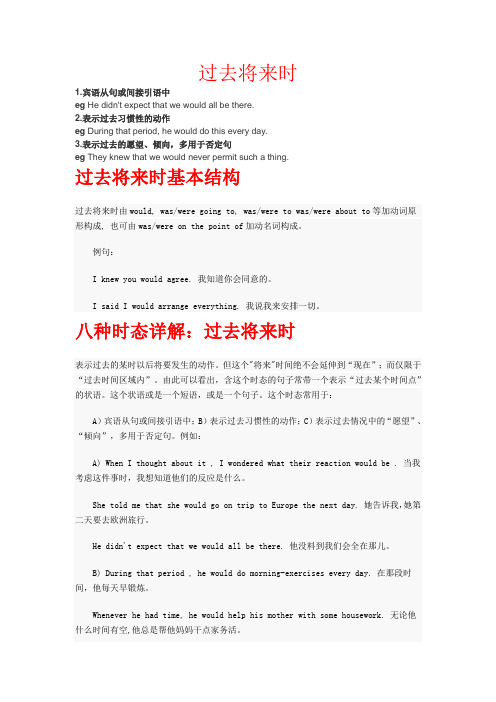
过去将来时1.宾语从句或间接引语中eg He didn't expect that we would all be there.2.表示过去习惯性的动作eg During that period, he would do this every day.3.表示过去的愿望、倾向,多用于否定句eg They knew that we would never permit such a thing.过去将来时基本结构过去将来时由would, was/were going to, was/were to was/were about to等加动词原形构成, 也可由was/were on the point of加动名词构成。
例句:I knew you would agree. 我知道你会同意的。
I said I would arrange everything. 我说我来安排一切。
八种时态详解:过去将来时表示过去的某时以后将要发生的动作。
但这个"将来"时间绝不会延伸到“现在”;而仅限于“过去时间区域内”。
由此可以看出,含这个时态的句子常带一个表示“过去某个时间点”的状语。
这个状语或是一个短语,或是一个句子。
这个时态常用于:A)宾语从句或间接引语中;B)表示过去习惯性的动作;C)表示过去情况中的“愿望”、“倾向”,多用于否定句。
例如:A) When I thought about it , I wondered what their reaction would be . 当我考虑这件事时,我想知道他们的反应是什么。
She told me that she would go on trip to Europe the next day. 她告诉我,她第二天要去欧洲旅行。
He didn't expect that we would all be there. 他没料到我们会全在那儿。
英语八大时态结构_含例句

时态(8个):一般现在时: 经常或习惯性的动作结构: 肯定句主语+be (am, is, are ) + 其他 eg: I am Chinese.否定句主语+be not +其他 eg: I am not a boy.疑问句 Be+主语+其他 eg: Are you a girl?或: 肯定句主语+动原+其他 (三单作主语动词要变形)eg: I (He) often get (gets) up early.否定句主语+don't+动原+其他 (三单作主语don't变doesn't)eg: I (She) don’t (doesn’t) like him.疑问句 DO+主语+动原+其他 (三单作主语do变does)eg: Do (Does) you (she) like playing baseball?关键词: sometimes=at times有时,often经常, usually通常, always总是,every day每天, on Sunday afternoon在周日下午, five days a week一周五天, three times a month 一个月三次…现在进行时: 正在发生的动作结构: 肯定句主语+be+动词的现在分词(ing)+其他 eg: I am reading now.否定句主语+be not+动词的现在分词(ing)+其他 eg: I am not working.疑问句 Be +主语+动词的现在分词+其他 eg: Are you sleeping?关键词:now现在, at the moment此刻, look, listen, keep quiet等提示语.一般将来时: 将要发生的动作结构: 肯定句主语+will+动词原型+其他 eg: I will call you later.否定句主语+will not +动词原型+其他 eg: I will not go to the park.疑问句 Will +主语+动词原型+其他 Will you go shopping with her?(will 可改为be going to ,当主语是第一人称时will可用shall)关键词:tomorrow, next year明年, tonight今晚, this year今年, at the end of this term这学期期末, from now on从现在开始, soon一会儿马上, later后稍后,in three days三天之内, in the future 未来…一般过去时: 过去发生的动作强调时间句子结构:肯定句主语+be(was,were)+其他 eg: I was born on July.1st, 2000.否定句主语+be not+其他 eg: I was not born in 1999.疑问句 Be+主语+其他 eg: Were you born in January?或: 肯定句主语+动词的过去式(ed)+其他 Lily went shopping yesterday.否定句主语+did not+动原+其他 eg: He did not go to school today.疑问句 Did+主语+动原+其他eg:Did she pass the test?关键词:yesterday昨天,last week上周, last year去年, 一段时间+ago如ten years ago十年前 five hours ago五小时前, in +年/月,on+具体日期...Just now=a moment ago刚才,in the old days从前, long ago很久以前...过去进行时: 过去正在发生的动作结构: 肯定句主语+was/were+动词的现在分词+其他eg: I was doing my homework at 8 o’clock yesterday evening.否定句主语+was/were not +动词的现在分词+其他They were not staying at home at this moment last Sunday.疑问句 Was/Were + 主语+ 动词的现在分词+其他Were you sleeping when I called you last night?关键词:具体时间如:at ten o'clock yesterday morning, at this moment last Sunday上周日的这个时候...现在完成时: 过去发生的动作对现在造成的影响强调动作或其产生的结果结构:肯定句主语+have/has+动词的过去分词+其他(三单变成has)eg: This year alone, we've already planted ten thousand trees否定句主语+have/has not+动词的过去分词+其他eg: He has not arrived at home yet.疑问句 Have/Has +主语+动词的过去分词+其他eg: Have you been to China?关键词:already已经, yet还, just刚刚, ever曾经, never从不,so far目前, for +一段时间,since+过去的具体时间,this year alone今年以来,these five years alone这五年以来",in the last ten years 在过去的十年中…过去将来时:结构: 肯定句主语+ would+动原+其他 eg: I didn't know if he would come.否定句主语+ would not +动原+其他eg: They were not going to go hiking unless they finished their homework.疑问句 Would+主语+动词原型+其他 (would you like是词组一个固定搭配一般用表示礼貌的问)eg: Would you like to have a dinner with me?(would可改为was/were going to ,主语第一人称时would也可以用should)过去完成时:结构: 肯定句主语+had +动词的过去分词+其他eg: Mr. Smith died yesterday. He had been a good friend of mine.否定句主语+had not +动词的过去分词+其他eg: He said he has not been to America.疑问句 Had+主语+动词的过去分词+其他eg: Had he completed his homework by the time you got there.关键词: 句子中的两个动作都发生在过去一、一般现在时:概念:经常、反复发生的动作或行为及现在的某种状况。
英语八大时态讲解及练习

英语八大时态讲解及练习文章类型:资料文章阅读次数: 28362日期:12/28/2008英语的时态〔tense〕是一种动词形式,不同的时态用以表示不同的时间与方式,下面就英语中常见的八种根本时态进展阐述,其它的时态都是在这八种时态的根底上结合而成的。
一、一般现在时:1.概念:经常、反复发生的动作或行为及现在的某种状况。
2.时间状语:always, usually, often, sometimes, every week (day, year, month…), oncea week, on Sundays,3.根本构造:动词原形〔如主语为第三人称单数,动词上要加〔e〕S〕4.否认形式:am/is/are+not;此时态的谓语动词假设为行为动词,那么在其前加don't,如主语为第三人称单数,那么用doesn't,同时复原行为动词。
5.一般疑问句:把be动词放于句首;用助动词do提问,如主语为第三人称单数,那么用does,同时,复原行为动词。
6.例句:. It seldom〔很少〕snows here.He is always ready to help others.Action speaks louder than words.二、一般过去时:1.概念:过去某个时间里发生的动作或状态;过去习惯性、经常性的动作、行为。
2.时间状语:ago, yesterday, the day before yesterday, last week(year, night, month…), in 1989, just now, at the age of 5, one day, long long ago, once upon a time, etc.3.根本构造:be动词;行为动词4.否认形式:was/were+not;在行为动词前加didn't,同时复原行为动词。
5.一般疑问句:was或were放于句首;用助动词do的过去式did 提问,同时复原行为动词。
英语常用八种基础时态讲解和练习

英语常用八种基础时态讲解和练习LEKIBM standardization office【IBM5AB- LEKIBMK08- LEKIBM2C】英语时态一般现在时一般现在时通常用动词原形表示,但当主语是第三人称单数(he, she, it, Tom)时需要在在动词原形后面加-e或-es.如:一般现在时的基本用法1.表示主语现在的特征和状态,通常不用时间状语。
He is twelve, she is at home. She likes bread.2. 表示经常发生、反复发生的动作。
这种用法中与always, usually, often, sometimes, hardly ever, never, once a week等频度副词连用。
She often goes to the movies on weekends.--When is your birthday?--My birthday is January 15th.3.表示客观真理、科学事实、格言等。
The sun always rises in the east.太阳总是从东方升起。
The teacher said that the earth goes around the sun.4.一般现在表示将来时。
①. 表示按时间表拟定的或安排好,到时就发生的事情或动作。
The train arrives at 10:30. There is plenty of time.火车十点三十分到达,还有充足的时间。
She comes back next week.她下周会回来。
②在时间状语从句和条件状语从句中。
I will discuss this with you when we meet next time.下次见面时咱们再讨论。
If he arrives, please give me a phone call.现在进行时构成:be(am, is are)+现在分词。
初中英语八大时态用法详解及真题巩固练习

初中英语八大时态用法详解及真题巩固练习一般现在时1. 概念:经常、反复发生的动作或行为及现在的某种状况。
2. 基本结构:①is/am/are;②do/does否定形式:①am/is/are + not ; ②此时态的谓语动词若为行为动词,则在其前加don't,如主语为第三人称单数,则用doesn't,同时还原行为动词。
3. 一般疑问句:①把 is/am/are 动词放于句首;②用助动词do提问,如主语为第三人称单数,则用does,同时,还原行为动词。
4. 用法:1) 经常性或习惯性的动作,常与表示频度的时间状语连用。
例如:I leave home for school at 7 every morning. 每天早上我七点离开家。
2) 客观真理,客观存在,科学事实。
例如:The earth moves around the sun. 地球绕太阳转动。
Shanghai lies in the east of China. 上海位于中国东部。
3) 表示格言或警句。
例如:Pride goes before a fall. 骄者必败。
注意:此用法如果出现在宾语从句中,即使主句是过去时,从句谓语也要用一般现在时。
例如:I knew that the earth goes around the sun when I was little.我小时候就知道地球绕太阳转。
4) 现在时刻的状态、能力、性格、个性。
例如:I don't want so much. 我不要那么多。
Ann writes good English but does not speak well.安英语写得不错,讲的可不行。
5) 一般现在时表示将来含义a. 下列动词 come, go, arrive, leave, start, begin, return 的一般现在时可以表示将来,主要用来表示在时间上已确定或安排好的事情。
英语八种时态讲解及练习

现在进行时
作谓语的动词用来表示动作(情况) 发生时间的各种形式称为时态。
1.概念:表示现阶段或说话时正在 进行的动作及行为。 2.时间状语:Now, at this time, days, look. listen等时间状语做标志。 3.基本结构:主语+be +doing +其 他 4.否定形式:主语+be +not +doing+ 其他 5.一般疑问句:把be动词放于句首。
现在分词的变法有
1)、一般在动词词尾加上-ing ,E.g. jump 2)、以不发音字母e结尾的动词,先 去e,再加-ing. E.g have write 3)、.以重读闭音节末尾只有一个辅 音字母结尾的词,它前面是单个元 音字母时要先将词尾的辅音字母双 写,再加上-ing. E.g. sit put 其句式 变换都在be上做文章。
10. I will go there when I _____(have, will have, has) time tomorrow. 11. He won’t come to the party unless he _____(be, will be, am, is, are) invited. 12. I’ll wait here until my mother ____(come, comes, will come) back. 13. Please return the book to the library as soon as you ______(finish, finishes, will finish) reading it. 14. Once you _____(see, sees, will see) him, you will never forget him.
初中英语八大时态全套精讲及练习题(附答案)
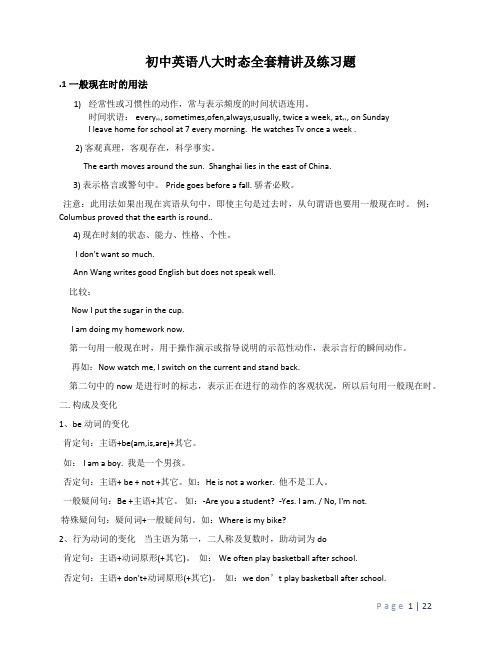
初中英语八大时态全套精讲及练习题.1 一般现在时的用法1)经常性或习惯性的动作,常与表示频度的时间状语连用。
时间状语: every…, sometimes,ofen,always,usually, twice a week, at…, on SundayI leave home for school at 7 every morning. He watches Tv once a week .2) 客观真理,客观存在,科学事实。
The earth moves around the sun. Shanghai lies in the east of China.3) 表示格言或警句中。
Pride goes before a fall. 骄者必败。
注意:此用法如果出现在宾语从句中,即使主句是过去时,从句谓语也要用一般现在时。
例:Columbus proved that the earth is round..4) 现在时刻的状态、能力、性格、个性。
I don't want so much.Ann Wang writes good English but does not speak well.比较:Now I put the sugar in the cup.I am doing my homework now.第一句用一般现在时,用于操作演示或指导说明的示范性动作,表示言行的瞬间动作。
再如:Now watch me, I switch on the current and stand back.第二句中的now是进行时的标志,表示正在进行的动作的客观状况,所以后句用一般现在时。
二. 构成及变化1、be动词的变化肯定句:主语+be(am,is,are)+其它。
如: I am a boy. 我是一个男孩。
否定句:主语+ be + not +其它。
如:He is not a worker. 他不是工人。
初中英语八种时态讲解与练习
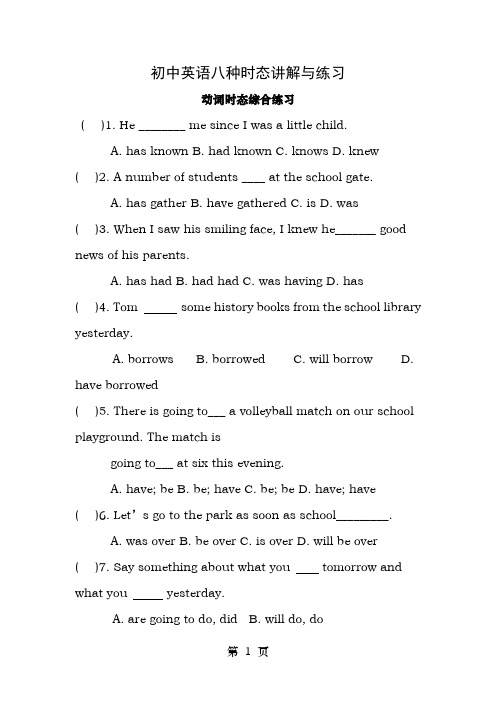
初中英语八种时态讲解与练习动词时态综合练习( )1. He ________ me since I was a little child.A. has knownB. had knownC. knowsD. knew( )2. A number of students ____ at the school gate.A. has gatherB. have gatheredC. isD. was( )3. When I saw his smiling face, I knew he_______ good news of his parents.A. has hadB. had hadC. was havingD. has( )4. Tom some history books from the school library yesterday.A. borrowsB. borrowedC. will borrowD. have borrowed( )5. There is going to___ a volleyball match on our school playground. The match isgoing to___ at six this evening.A. have; beB. be; haveC. be; beD. have; have( )6. Let’s go to the park as soon as school_________.A. was overB. be overC. is overD. will be over( )7. Say something about what you tomorrow and what you yesterday.A. are going to do, didB. will do, doC. will do , have doneD. have done, did( )8. When Miss Zhao came into the classroom, the students___.A. talkedB. were talkingC. talkingD. talk ( )9. We_______ the problem before, but we enjoyed hearing it again.A. heardB. have heardC. had heardD. was hearing ( )10.By the time he was twelve, Edison__________ to make a living by himself.A. would beginB. has begunC. had begunD. was begun( )11.When___to learn EnglishA. does she beginB. did she beginC. has she begunD. she began( )12.Could you ring me up as soon as he ___A. arrivedB. would arriveC. arrivesD. will arrive ( )13.Don’t get off the bus until it _______.A. has stoppedB. stoppedC. will stopD. shall stop( )14.I the film several times already.A. seesB. sawC. have seenD. will( )15.-Excuse me. Look at the sign: NO SMOKING!-Sorry, I___it.A. don't seeB. didn't seeC. haven't seenD. won't see ( )16.That dinner was the most expensive mealwe_________.A. would haveB. have hadC. had never hadD. had ever had( )17.We won't go to the Great Wall if it ___ tomorrow.A. snowsB. snowedC. snowD. will snow( )18.Tell me who to our party tomorrow.A. is comingB. was comingC. comeD. have come ( )19.4 The sun ___ in the east and___ in the west.A. raises; setB. rise; setsC. rises; setsD. rises; set( )20.I _________ ten minutes to decide whether I should refuse the offer.A. gaveB. was givenC. was givingD. had given( )21.Mr Li came in just now and worried.A. lookedB. lookC. looksD. has looked ( )22.When Jack arrived he learned Mary______ for almost an hour.A. had goneB. had set offC. had leftD. had been away ( )23.Meimei ___ English on the radio every morning.A. had studiedB. studiesC. studyD. studied( )24. ___ the girl ___ to schoolA. Where does; goB. How do; goC. How does; goesD. How does; go( )25.The boy off the horse two minute ago.A. fallB. fallsC. fellD. felt( )26.The pen I ______ I ______ is on my desk, right under my nose.A. think; lostB. thought; had lostC. think; had lostD. thought; have lost( )27.How ____ it in EnglishA. you sayB. do you sayC. to speakD. about talk ( )28.She will go if it ___ tomorrow.A. isn't rainB. don't rainC. doesn't rainD. didn't rain( )29.-Tom didn't go to see the film with you last night, did heA. No, he didB. No, he doesn'tC. Yes, he didD. Yes, he didn't( )30.Listen! Someone___ at the door of the meeting-room.A. knockedB. knocksC. is knockingD. was knocking( )31.I first met Lisa three years ago. She_________ at a radio shop at the time.A. has workedB. was workingC. had been workingD. had worked( )32.-- you ___ your breakfast-Yes, I have.-When ___ you ___ it-Twenty minutes ago.A. Have; have; have; hadB. Did; have; did; haveC. Have; had; do; haveD. Have; had; did; have ( )33.--Who is Jerry Cooper---- _____________ I saw you shaking hands with him at the meeting.A. Don’t you meet him yetB. Hadn’t you met him yetC. Didn’t you meet him yetD. Haven’t you met him yet.( )34.Will you please ___ this rubber to Xiao LingA. to giveB. givingC. gaveD. give( )35.The old man ___ out for a walk in the evening.A. used to goingB. goC. is used to goingD. will go( )36.I have no idea what ___ while I was asleep.A. has happenedB. was happenedC. happenedD. had happened( )37.-I have finished my homework. -When ____ you ____ itA. have; finishedB. do; finishC. did; finishD. will; finish( )38.He is good at maths and he ___ hard.A. always studyB. always is studyingC. is always studyingD. studies always( )39.They don’t live here. They to FuShan a year ago.A.moveB.movedC. will moveD. has moved( )40.-What is he doing now-He___a picture.A. drawsB. drewC. is drawingD. was drawing( )41.-He has been in the next room.-Sorry, I thought that he___ in Shanghai.A. wasB. isC. will beD. has been( )42.Don't talk with each other. The baby___.A. sleepsB. sleptC. was sleepingD. is sleeping ( )43.My father often in the office very late.A. worksB. is workingC. workedD. has worked( )44.-Who sings best in your class -Mary____.A. isB. willC. doesD. do( )45.The bread bad now. Throw it away at once.A.smellB.smeltC. smellsD.will smell ( )46.By the end of last term, we___over two thousand new words.A. learnedB. have learnedC. will learnD. had learned( )47.There___ two English films next week.A. is going to beB. are going to haveC. will haveD. are going to be( )48.Next year my little sister ____ ten years old.A. is to beB. is going to beC. shall beD. will be ( )49.Lucy ___ to Shanghai once.A. wentB. has goneC. has beenD. had been ( )50.The old man ___ in this house since 1949.A. has livedB. had livedC. is livingD. lives KEY:(1-5) ABBBB (6-10) CABCC (11-15) BCACB (16-20) DAACB (21-25) ADBDC (26-30) BBCCC(31-35) BDDDC (36-40) DCCBC (41-45) ADACC (46-50) DDDCA一般现在时1. 表示事物或人物的特征、状态。
初中英语八种时态详解及练习
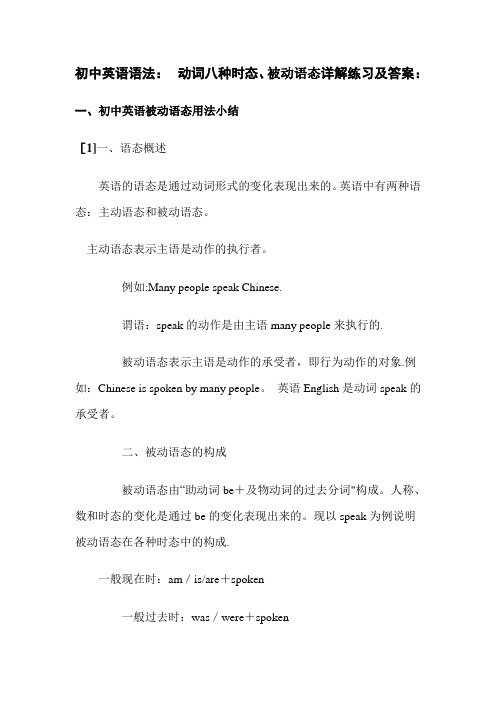
初中英语语法:动词八种时态、被动语态详解练习及答案:一、初中英语被动语态用法小结[1]一、语态概述英语的语态是通过动词形式的变化表现出来的。
英语中有两种语态:主动语态和被动语态。
主动语态表示主语是动作的执行者。
例如:Many people speak Chinese.谓语:speak的动作是由主语many people来执行的.被动语态表示主语是动作的承受者,即行为动作的对象.例如:Chinese is spoken by many people。
英语English是动词speak的承受者。
二、被动语态的构成被动语态由“助动词be+及物动词的过去分词"构成。
人称、数和时态的变化是通过be的变化表现出来的。
现以speak为例说明被动语态在各种时态中的构成.一般现在时:am/is/are+spoken一般过去时:was/were+spoken一般将来时:will/shall be+spoken现在进行时:am/is/are being+spoken过去进行时:was/were being+spoken现在完成时:have/has been+spoken过去完成时:had been + spoken三、被动语态的用法(1)不知道或没有必要说明动作的执行者是谁。
例如:Some new computers were stolen last night.一些新电脑在昨晚被盗了.(不知道电脑是谁偷的)This bridge was founded in 1981。
这座桥竣工于1981年。
(2)强调动作的承受者,而不强调动作的执行者。
例如:The glass was broken by Mike.玻璃杯是迈克打破的。
This book was written by him.这本书是他写的.Your homework must be finished on time.你们的家庭作业必须及时完成。
四、主动语态变被动语态的方法(1)把主动语态的宾语变为被动语态的主语。
初中英语八大时态讲解及练习(全)
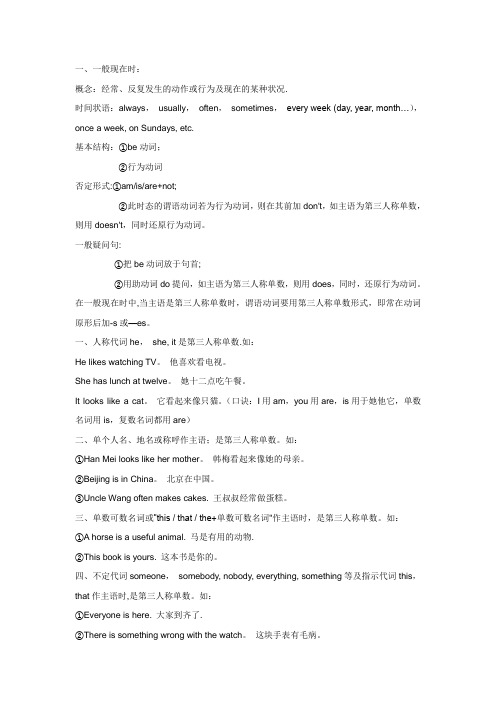
一、一般现在时:概念:经常、反复发生的动作或行为及现在的某种状况.时间状语:always,usually,often,sometimes,every week (day, year, month…),once a week, on Sundays, etc.基本结构:①be动词;②行为动词否定形式:①am/is/are+not;②此时态的谓语动词若为行为动词,则在其前加don't,如主语为第三人称单数,则用doesn't,同时还原行为动词。
一般疑问句:①把be动词放于句首;②用助动词do提问,如主语为第三人称单数,则用does,同时,还原行为动词。
在一般现在时中,当主语是第三人称单数时,谓语动词要用第三人称单数形式,即常在动词原形后加-s或—es。
一、人称代词he,she, it是第三人称单数.如:He likes watching TV。
他喜欢看电视。
She has lunch at twelve。
她十二点吃午餐。
It looks like a cat。
它看起来像只猫。
(口诀:I用am,you用are,is用于她他它,单数名词用is,复数名词都用are)二、单个人名、地名或称呼作主语;是第三人称单数。
如:①Han Mei looks like her mother。
韩梅看起来像她的母亲。
②Beijing is in China。
北京在中国。
③Uncle Wang often makes cakes. 王叔叔经常做蛋糕。
三、单数可数名词或”this / that / the+单数可数名词"作主语时,是第三人称单数。
如:①A horse is a useful animal. 马是有用的动物.②This book is yours. 这本书是你的。
四、不定代词someone,somebody, nobody, everything, something等及指示代词this,that作主语时,是第三人称单数。
初中英语八种时态-讲解+练习
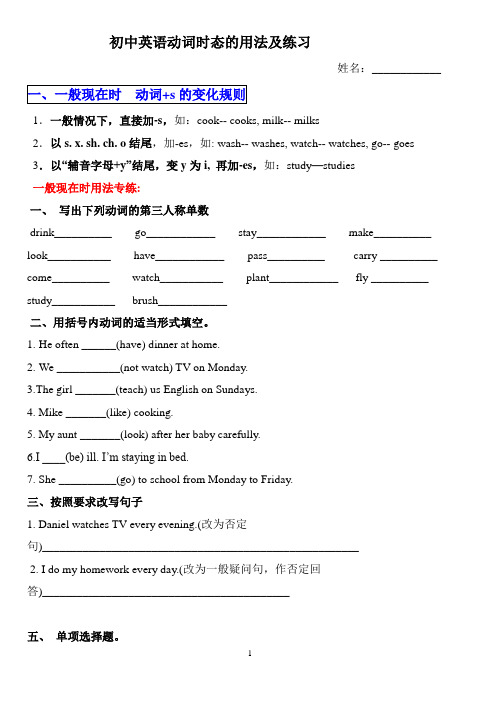
初中英语动词时态的用法及练习姓名:____________ 一、一般现在时动词+s的变化规则1.一般情况下,直接加-s,如:cook-- cooks, milk-- milks2.以s. x. sh. ch. o结尾,加-es,如: wash-- washes, watch-- watches, go-- goes3.以“辅音字母+y”结尾,变y为i, 再加-es,如:study—studies一般现在时用法专练:一、写出下列动词的第三人称单数drink__________ go____________ stay____________ make__________ look___________ have____________ pass__________ carry __________ come__________ watch___________ plant____________ fly __________ study___________ brush____________二、用括号内动词的适当形式填空。
1.He often ______(have) dinner at home.2.We ___________(not watch) TV on Monday.3.The girl _______(teach) us English on Sundays.4. Mike _______(like) cooking.5. My aunt _______(look) after her baby carefully.6.I ____(be) ill. I’m staying in bed.7. She __________(go) to school from Monday to Friday.三、按照要求改写句子1. Daniel watches TV every evening.(改为否定句)_______________________________________________________2. I do my homework every day.(改为一般疑问句,作否定回答)___________________________________________五、单项选择题。
八种时态讲与练 for the teacher
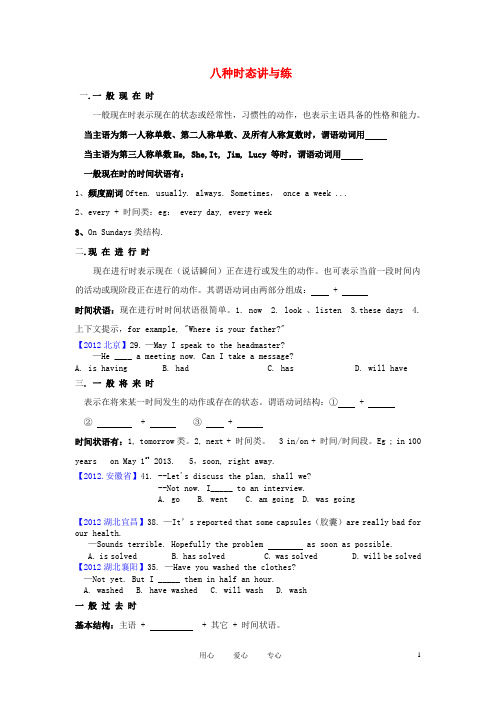
八种时态讲与练一.一般现在时一般现在时表示现在的状态或经常性,习惯性的动作,也表示主语具备的性格和能力。
当主语为第一人称单数、第二人称单数、及所有人称复数时,谓语动词用当主语为第三人称单数He, She,It, Jim, Lucy 等时,谓语动词用一般现在时的时间状语有:1、频度副词Often. usually. always. Sometimes, once a week ...2、every + 时间类:eg: every day, every week3、On Sundays类结构.二.现在进行时现在进行时表示现在(说话瞬间)正在进行或发生的动作。
也可表示当前一段时间内的活动或现阶段正在进行的动作。
其谓语动词由两部分组成: +时间状语:现在进行时时间状语很简单。
1. now 2. look 、listen 3.these days 4.上下文提示,for example, "Where is your father?"【2012北京】29. —May I speak to the headmaster?—He ____ a meeting now. Can I take a message?A. is havingB. hadC. hasD. will have三. 一般将来时表示在将来某一时间发生的动作或存在的状态。
谓语动词结构:① +② + ③ +时间状语有:1, tomorrow类。
2, next + 时间类。
3 in/on + 时间/时间段。
Eg ; in 100 years on May 1st 2013. 5,soon, right away.【2012.安徽省】41. --Let's discuss the plan, shall we?--Not now. I_____ to an interview.A. goB. wentC. am goingD. was going【2012湖北宜昌】38. —It’s reported that some capsules(胶囊)are really bad for our health.—Sounds terrible. Hopefully the problem as soon as possible.A. is solvedB. has solvedC. was solvedD. will be solved 【2012湖北襄阳】35. —Have you washed the clothes?—Not yet. But I _____ them in half an hour.A. washedB. have washedC. will washD. wash一般过去时基本结构:主语 + + 其它 + 时间状语。
高中时态题练习题及讲解
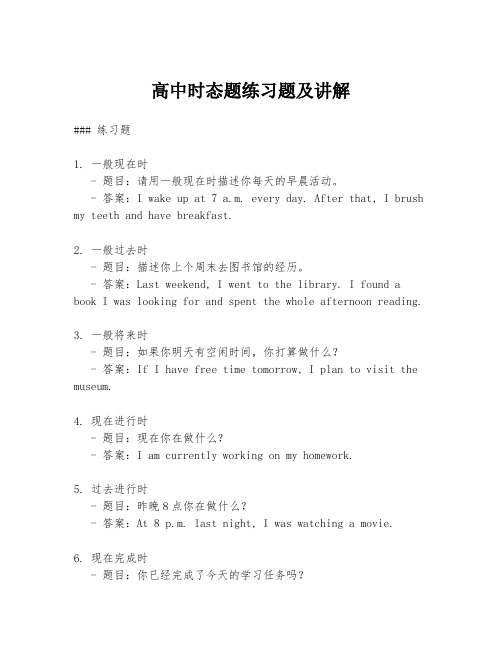
高中时态题练习题及讲解### 练习题1. 一般现在时- 题目:请用一般现在时描述你每天的早晨活动。
- 答案:I wake up at 7 a.m. every day. After that, I brush my teeth and have breakfast.2. 一般过去时- 题目:描述你上个周末去图书馆的经历。
- 答案:Last weekend, I went to the library. I found a book I was looking for and spent the whole afternoon reading.3. 一般将来时- 题目:如果你明天有空闲时间,你打算做什么?- 答案:If I have free time tomorrow, I plan to visit the museum.4. 现在进行时- 题目:现在你在做什么?- 答案:I am currently working on my homework.5. 过去进行时- 题目:昨晚8点你在做什么?- 答案:At 8 p.m. last night, I was watching a movie.6. 现在完成时- 题目:你已经完成了今天的学习任务吗?- 答案:Yes, I have completed my study tasks for today.7. 过去完成时- 题目:到你离开家的时候,你已经做了什么?- 答案:By the time I left home, I had finished my breakfast.8. 将来完成时- 题目:到本周末,你将完成多少作业?- 答案:By the end of this weekend, I will have finished all my homework.9. 现在完成进行时- 题目:你一直在做的事情是什么?- 答案:I have been studying English for the past three months.10. 被动语态- 题目:这本书已经被翻译成多种语言了吗?- 答案:Yes, the book has been translated into many languages.### 解析1. 一般现在时- 描述的是习惯性动作或普遍真理。
英语8种时态讲解及练习
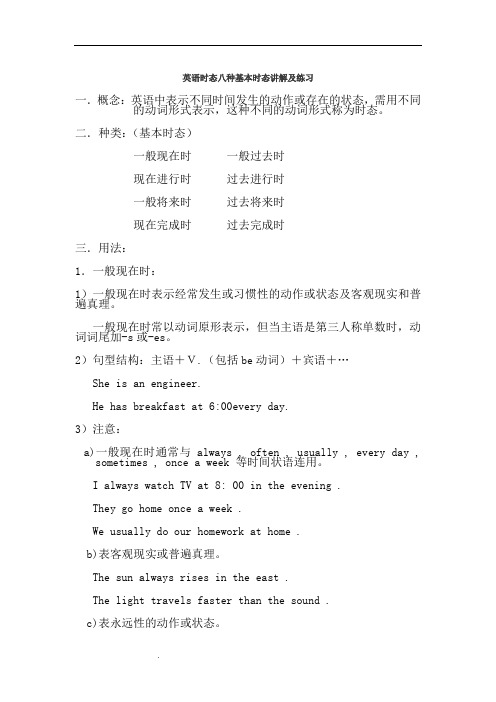
英语时态八种基本时态讲解及练习一.概念:英语中表示不同时间发生的动作或存在的状态,需用不同的动词形式表示,这种不同的动词形式称为时态。
二.种类:(基本时态)一般现在时一般过去时现在进行时过去进行时一般将来时过去将来时现在完成时过去完成时三.用法:1.一般现在时:1)一般现在时表示经常发生或习惯性的动作或状态及客观现实和普遍真理。
一般现在时常以动词原形表示,但当主语是第三人称单数时,动词词尾加-s或-es。
2)句型结构:主语+V.(包括be动词)+宾语+…She is an engineer.He has breakfast at 6:00every day.3)注意:a)一般现在时通常与always , often , usually , every day ,sometimes , once a week 等时间状语连用。
I always watch TV at 8: 00 in the evening .They go home once a week .We usually do our homework at home .b)表客观现实或普遍真理。
The sun always rises in the east .The light travels faster than the sound .c)表永远性的动作或状态。
He lives in the country .4)第三人称单数变化形式。
a)一般情况动词在词尾加-s .come---comes speak---speaks work---works live---livesb)以o, s, x, ch, sh结尾的单词在词后加-es.do---does go---goes finish---finishes brush---brushesfix---fixes pass---passes watch---watchesc)以“辅音字母+y”结尾的单词变y为i加-es.Study---studies carry-carries cry---criesd)以“元音字母+y”结尾的单词直接加-s.play---plays stay---stays例句:我们每天晚上九点做作业。
英语语法复习——八大时态

中考英语语法复习——八大时态初中英语八大时态(讲与练)(一)谓语动词的形式:英语的时态是通过谓语动词的变化来体现的。
因此,了解谓语动词的形式及其变化规律非常重要。
英语的实义动词有以下五种形式:(1) 动词原形:动词原形在句子中形式不变。
主要用于主语为第一、二人称的一般现在时,情态动词之后,或根据语法规定必须用动词原形的其他情况。
(2) 一般现在时第三人称单数形式(简称现单三):主要用于主语为第三人称单数的一般现在时。
(3) 过去式:主要用于一般过去时。
(4) 现在分词:主要用于进行时态。
(5) 过去分词:主要用于完成时态,或被动语态。
谓语动词一般现在时第三人称单数(现单三)的构成,见下表:写和读音规则如下表:的不规则动词表。
谓语动词现在分词一律由动词原形加-ing构成,规则如下表:“时态”就是通过谓语动词的形态变化,来表达动作发生的时间(现在、过去、将来、过去将来)及所处的状态(一般、进行、完成、完成进行)。
1、一般现在时(1)构成:通常以动词原形表示。
主语为第三人称单数时,用单三形式。
(2)用法:1)表示现状、性质、状态和经常的或习惯性的动作。
He has an uncle.他有个叔叔。
Autumn follows summer.夏天之后是秋天。
这些动词可与often, usually, always, sometimes, every day, once a week, on Sundays, never 等表示经常性或习惯性的时间状语连用。
例如:Do you often go to the cinema? 你经常去看电影吗?Tom does not study as hard as Jane. 汤姆在学习方面不如简努力。
My father never takes a bus; he walks to his office.我父亲从来不坐公共汽车,他走着去上班。
2)表示客观现实或普遍真理。
The sun rises in the east. 太阳从东方升起。
仁爱初中英语动词八种时态的精讲精练
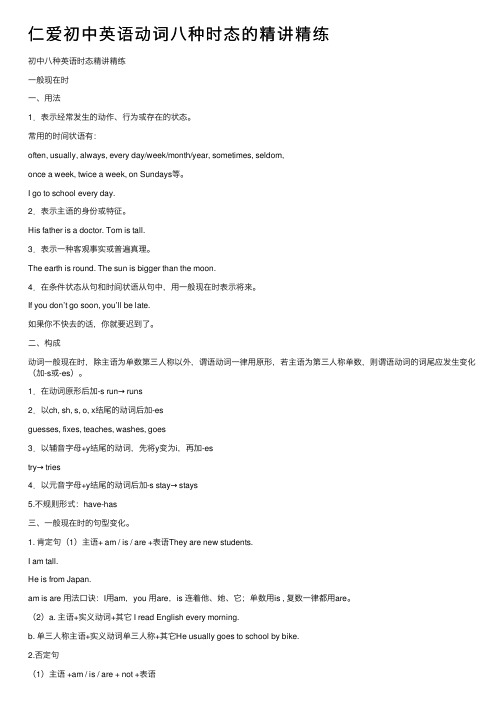
仁爱初中英语动词⼋种时态的精讲精练初中⼋种英语时态精讲精练⼀般现在时⼀、⽤法1.表⽰经常发⽣的动作、⾏为或存在的状态。
常⽤的时间状语有:often, usually, always, every day/week/month/year, sometimes, seldom,once a week, twice a week, on Sundays等。
I go to school every day.2.表⽰主语的⾝份或特征。
His father is a doctor. Tom is tall.3.表⽰⼀种客观事实或普遍真理。
The earth is round. The sun is bigger than the moon.4.在条件状态从句和时间状语从句中,⽤⼀般现在时表⽰将来。
If you don’t go soon, you’ll be late.如果你不快去的话,你就要迟到了。
⼆、构成动词⼀般现在时,除主语为单数第三⼈称以外,谓语动词⼀律⽤原形,若主语为第三⼈称单数,则谓语动词的词尾应发⽣变化(加-s或-es)。
1.在动词原形后加-s run→ runs2.以ch, sh, s, o, x结尾的动词后加-esguesses, fixes, teaches, washes, goes3.以辅⾳字母+y结尾的动词,先将y变为i,再加-estry→ tries4.以元⾳字母+y结尾的动词后加-s stay→ stays5.不规则形式:have-has三、⼀般现在时的句型变化。
1. 肯定句(1)主语+ am / is / are +表语They are new students.I am tall.He is from Japan.am is are ⽤法⼝诀:I⽤am,you ⽤are,is 连着他、她、它;单数⽤is , 复数⼀律都⽤are。
(2)a. 主语+实义动词+其它 I read English every morning.b. 单三⼈称主语+实义动词单三⼈称+其它He usually goes to school by bike.2.否定句(1)主语 +am / is / are + not +表语She is not a nurse.(2)a. 主语+don’t +动词原形 +其它如:I don’t play soccer after school.b.单三⼈称主语+doesn’t +动词原形+其它He doesn’t go to the park after school.3.⼀般疑问句:(1)Am / Is / Are +主语 +表语?Is your mother a teacher?(2)a. Do + 主语 +动词原形 +其它?Do you speak English?b. Does +单三⼈称主语+动词原形+其它?Does your brother have a wide mouth?4.特殊疑问句:特殊疑问词 +⼀般疑问句?What time does your mother get up every day?专项练习题⼀、写出下列动词的第三⼈称单数形式1.study ________2. play________3.watch _____4.wash _______5.have _______6.ride _______7.take _______8.worry_______9.help_______ 10.say________ 11.put________ 12.teach________ 13.fly________ 14.eat ________ 15.go ___ ____16.guess______ 17.read _______ 18.do ____ ___19.call ________ 20.cry ________1-5 studies, plays, watches, washes, has6-10. rides, takes, worries, helps, says 11-15 puts,teaches, flies, eats, goes16-20 guesses, reads, does, calls, cries⼆、⽤所给动词的适当形式填空1. He often ___ ___(have) dinner at home.2. Daniel and Tommy ___ __(be) in Class One.3. We ___ ____(not watch) TV on Monday.4. Nick ____ __(not go) to the zoo on Sunday.5. _ ____ they __ __(like) the World Cup?6. What ___ _they often _ ___(do) on Saturdays?7. _______ your parents _______(read) newspapers every day?8. The girl ____ ___(teach) us English on Sundays.9. She and I ________(take) a walk together every evening.10. The moon ________ (travel) round the earth.11. It usually ________ (take) me more than two hours tofinish my homework.12. I will tell him the good news as soon as he ________(come) back.13. Miss Gao is very busy. She ________ (sleep) six hoursa day.14. Look! Susan ________ (dance) in the garden. She often________ (dance) there.15. The children will go to the Summer Palace if it________ (not rain) tomorrow.16.I_________ any pears (not have).But Mary_________some(have).17.What language ____ you _____? (speak)18.My brother _____ to be a scientist. (not like)19. We ______ Japanese at school. (not study)20. He _____ playing football. (not like)1. has2. are3. don’t have4. doesn’t go5. Do like6. do, do7. Do, read8. teaches9. take 10. travels 11. takes 12. comes 13. sleeps 14. is danc ing, dances 15. doesn’t rain 16. don’t have, has 17. do, speak18. doesn’t like 19. don’t study 20. doesn’t like三、按照要求改写句⼦1.Daniel watches TV every evening.(改为否定句)_________________________2.I do my homework every day.(改为⼀般疑问句,并作肯、否定回答)________________________________________________________ 3.Amy likes playing computer games.(改为⼀般疑问句,并作肯、否定回答) ___________________________________________________4.We go to school every morning.(改为否定句)____________________________5.Sun Yang usually washes some clothes on Saturday.否定句: _____________⼀般疑问句: ________________划线提问: ____________6. Tom does his homework at home.否定句: ______________⼀般疑问句: ____________划线提问_____________1. Daniel doesn’t watch TV every evening.2. Do you do your homework every day?Yes, I do. No, I don’t.3. Does Amy like playing computer games?Yes, she does. No, she doesn’t.4. We don’t go to school every morning.5. Sun Yang doesn’t usually wash any clothes on Saturday.Does Sun Yang usually wash any clothes on Saturday?What does Sun Yang usually do on Saturday?6. Tom doesn’t do his homework at home.Does Tom do his homework at home?Where does Tom do his homework?四、选⽤所给的词语适当形式填空give, rain, enjoy, sing, return, borrow, keep1. It often ______ in my hometown in summer.2. Sometimes the birds _______ in the tree.3. Joe usually ____ books from the school library, but shenever _____ them on time.4. May I ________ the dictionary for a week?5. The little boy________himself in the garden on Saturdays.6. Mary is a good girl. She often ________ me a hand when I need some help.1. rains2. sing3. borrows, returns4. keep5. enjoys6. gives⼀般过去时的⽤法⼀、定义:表⽰过去某⼀时间所发⽣的动作或存在的状态;表⽰在过去⼀段时间内,经常性或习惯性的动作。
初中英语八大时态的详细讲解与练习
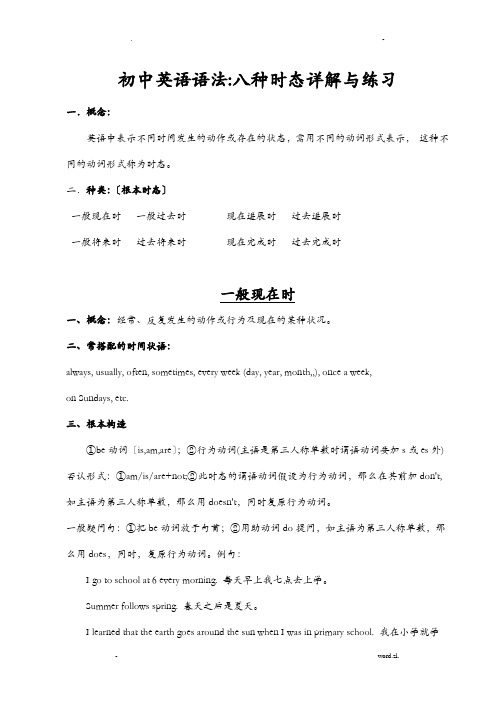
初中英语语法:八种时态详解与练习一.概念:英语中表示不同时间发生的动作或存在的状态,需用不同的动词形式表示,这种不同的动词形式称为时态。
二.种类:〔根本时态〕一般现在时一般过去时现在进展时过去进展时一般将来时过去将来时现在完成时过去完成时一般现在时一、概念:经常、反复发生的动作或行为及现在的某种状况。
二、常搭配的时间状语:always, usually, often, sometimes, every week (day, year, month…), once a week,on Sundays, etc.三、根本构造①be动词〔is,am,are〕;②行为动词(主语是第三人称单数时谓语动词要加s或es外) 否认形式:①am/is/are+not;②此时态的谓语动词假设为行为动词,那么在其前加don't,如主语为第三人称单数,那么用doesn't,同时复原行为动词。
一般疑问句:①把be动词放于句首;②用助动词do提问,如主语为第三人称单数,那么用does,同时,复原行为动词。
例句:I go to school at 6 every morning. 每天早上我七点去上学。
Summer follows spring. 春天之后是夏天。
I learned that the earth goes around the sun when I was in primary school. 我在小学就学过地球是围绕太阳转的。
Pride goes before a fall. 骄者必败。
四、根本用法:1) 描述当前时间经常出现、反复发生的动作或存在的状态。
在这种情景中,句子常带有表示频率的时间状语:always , everyday , often , once a week (month , year , etc.) , sometimes , seldom , usually等等,以表示句中的动作或状态是习惯性的、经常性的。
初中八大时态讲解与练习
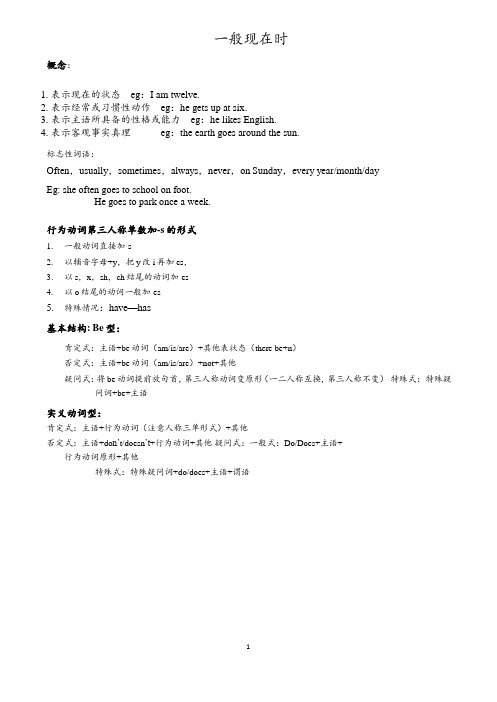
一般现在时概念:1. 表示现在的状态eg:I am twelve.2. 表示经常或习惯性动作eg:he gets up at six.3. 表示主语所具备的性格或能力eg:he likes English.4. 表示客观事实真理eg:the earth goes around the sun.标志性词语:Often,usually,sometimes,always,never,on Sunday,every year/month/dayEg: she often goes to school on foot.He goes to park once a week.行为动词第三人称单数加-s 的形式1. 一般动词直接加-s2. 以辅音字母+y,把 y 改 i 再加 es,3. 以 s,x,sh,ch 结尾的动词加-es4. 以 o 结尾的动词一般加-es5. 特殊情况:have—has基本结构: Be 型:肯定式:主语+be 动词(am/is/are)+其他表状态(there be+n)否定式:主语+be 动词(am/is/are)+not+其他疑问式:将 be 动词提前放句首,第三人称动词变原形(一二人称互换,第三人称不变)特殊式:特殊疑问词+be+主语实义动词型:肯定式:主语+行为动词(注意人称三单形式)+其他否定式:主语+do n’t/doesn’t+行为动词+其他疑问式:一般式:Do/Does+主语+行为动词原形+其他特殊式:特殊疑问词+do/does+主语+谓语小试牛刀:写出下列动词的第三人称形式wash:match:study:finish:go:snow:carry:stop: see: drive:let:teach:keep: join: put:do: drink: toy: play: begin:take:run: fly: talk: stay:look:watch:think:carry:fix:单项选择1. There an English film at the cinema now.A:is B:are C:am D:be2. The picture nice.A:look B:looks C:looked D:be look3. He sits down and soon asleep.A:fall B:falling C:falled D: falls4. The water sweet.A:drinking B:drinks C:drink D:to drink5. I up at six but Mike up at sevenA:get,gets B:get ,get C:gets,get D:getting, to get6. My father for eight hours every day.A:working B:works C:work D:to work7. Uncle Wang never English, because he know how to say it.A:speak,doesn’t B:speak,don’t C:speaks,don’t D:speaks,doesn’t 8. On Sunday my daughter watching TV and my son to play footballwith his friends.A:like,want B:likes,want C:like,wants D:likes,wants 9. Su Yang usually some clothes on Sunday.A:washed B:washs C:washes D:washing 10. Su Hai and Su Yang eight lessons this term.A:have B:has C:haves D:having用所给词的正确形式填空A. We often (not play)on the playground.B.you (brush) your teeth every day.C. How many lessons your classmate (have) on Sunday.D. It (take) me two hours to finish my homework every day.E. The child often (watch) TV in the evening.F. What (do) he usually (do) after school.G. John (study) Math , Chinese ,English ,Science and Art at school.H. Mr. Wang often (go) to Shanghai.I. There (be) a football match on TV every morning.J. We (not watch)TV on Monday.句式训练➢Do you like to play football after school?肯定句肯定/否定回答:➢I have many books.否定句:一般疑问句:肯定回答:否定回答:➢Nancy doesn’t run fast.肯定句:➢I usually play football on Friday afternoon.否定句:一般疑问句:特殊疑问句:肯定/否定回答:➢Tom does his homework at home.否定句:一般疑问句:特殊疑问句:➢Mike has two letters for him.否定句:一般疑问句:特殊疑问句:否定回答:判断正误1. Is your brother speak English?2. Does he likes going fishing?3. Jane do his homework every morning.4. He like play basketball with his friends.5. We eats dinner at six and go to bed at eleven.6. My dog runs fast.7. He speak English very well.8. What do they usually do on Saturday.9. My mother don’t have breakfast this morning.10. I like reading books on the library every day.中考真题1.Jenny! Do you know that one-third of the boys in our class the singer Zhang Shao Han?A. likeB. likesC.liking2. The sense of happiness will increase if you what you like to do.A. doB. didC. will do3. Betty will ring me up when she inBeijing.A. arriveB. arrivesC. arrivedD. willarrive4. If you your homework, you can go out to play football.5.Now my father his bike to work every day instead of driving.A. rideB. r od eC. ridesD. will ride6. This girl is rea d y t o help p eo pl e an y time. Wh e n sh e is on t h e bu s,sh e al w a y s her seat to someone in need.A. givesB. giveC. gaveD.giving概念:一般过去时表示过去某个时间収生的动作或存在的状态. Eg: I got up at seven yesterday表示过去经常収生的动作或存在的状态. Eg: he always went to school by car last term标志性词语:yesterday,last month/year/week/night,the day before yesterday,in the past,at that time,two days ago,just n ow……..动词过去时的变化规则:一般在词尾直接+ed play——played以 e 结尾的动词直接+d taste—— tasted末尾三个字母以“辅+元+辅”且为重读闭音节,双写末尾辅音+ed stop——stopped以辅音字母+y,改 y 为 i 再+ed study——studied不规则动词过去式:am/is: a re:do:see:sa y:give: eat:w rit e: sp en d:get:take:sp eak:drin k:g o:r un:rid e:sle ep:c o me:sin g:swim:s t and:has/ha ve:pu t:sit:rea d:结构:Be 型肯定式:主语+be 动词(was/were)+其他否定式:主语+wasn’t/weren’t+其他疑问式:Be 动词+主语+其他(一二人称互换,第三人称不变)特殊疑问句:特殊疑问词+was/were+主语+其他实义动词型肯定式:主语+动词过去式+其他否定式:主语+didn’t+动词原形+其他疑问式:Did+主语+动词原形+其他特殊疑问句:特殊疑问词+did+主语+动词原形+其他用所给单词正确形式填空◆We (enjoy) ourselves at the party last night.◆Jack (study) for the English test last Sunday.◆ you (go) to the Great Wall last year?◆What day (be) it yesterday?◆The old man (be)ill and went to see a doctor.◆We (have) a party last night.◆We (visit) the museum and went home.◆—How (be) the students? —They were very friendly.◆My mother (not do) housework yesterday.◆—he (have) lunch at nine? —No, he did n’t.◆They (buy) a guitar yesterday.◆the cat (eat)a bird yesterday night.◆They (play)chess in the classroom last PE lesson.◆Nancy (pick)up orange on the farm last week.◆My mother (cook)a nice food last spring festival.◆I (be)at school just now.◆He (be)at the camp last week.◆The mobile phone (be)on the table yesterday evening.◆I (make)a model ship with Mike yesterday.◆What (do)you do last month.单项选择( ) 1. Lee his mobile phone at home.A. leaveB. leavesC. leavedD. left( ) 2. he a good rest? No, he didn’t.A. Do, hadB. Did, haveC. Did, hadD. Was, had( ) 3. As soon as he , he to his family.A. arrived, writesB. arrived, writtenC. arrived, wroteD. arriveds, write( ) 4. Mr. Black was late because he his way.A. lostedB. loseC. losesD. lost( ) 5. When Lee school this morning?A. did, got toB. did, get toC. did, getD. did, got( ) 6. Will you please say it again? I quite you.A. didn’t, hearB. don’t, heardC. didn’t, heardD. don’t, hear ( ) 7. you at six o’c lock yesterday?A. Do ,get upB. Did, get upC. Do, got upD. Did, got up ( ) 8.What did you see ?A. nowB. every dayC. these daysD. just now ( ) 9.He went into the room and the door.A. lockB. lockingC. locksD. locked ( ) 10. —What you last week? —I bought a bag.A. did ,buyB. did , boughtC. do, buyD. do, bought ( ) 11. —he his lunch? —Yes, he did.A. Does ,hasB. Does, haveC. Did, haveD. Did, had ( )12.—Did the thieves into the car? —No, they .A. fell, did n’tB. fall(落下), didC. jump(跳), didn’tD. jump, did ( ) 13. -When did May come back from Hong Kong?-She from Hong Kong last Friday.A. come backB. comes backC. returned backD. came back ( ) 14. she this dictionary in the bookshop nearby last week?A. Did, buyB. Does, buyC. Did, boughtD. Does, buys ( ) 15. He to the station this morning and was for the train.A. hurry, in timeB. hurries, on timeC. hurried, in timeD. hurried, at time句型转换1. Frank read an interesting book about history. (一般疑问句)Frank an interesting book about history?2. Thomas spent RMB 10 on this book. (否定句)Thomas RMB 10 on this book.3. I didn’t have any friends. (一般疑问句)have friends?4. She watched TV after supper(划线部分提问)she after supper.5. There was some orange in the fridge.(一般疑问句)there_ orange in the fridge?改错题1. How is Jane yesterday?2. He go to school by bus last week.3. He often goes home at 6:00 last month.4. I can fly kites seven years ago.5. Did you saw him just now.6. Tom wasn’t watch TV last night.7. I didn’t my homework yesterday. 8. He wait for you three hours ago.9. Who find it just now ? 10. What did he last week?综合训练1.They read English last night.否定句:一般疑问句:肯定/否定回答:划线部分提问:2.She didn’t buy a dictionary last week.肯定句:一般疑问句:肯定/否定回答:划线部分提问:一般将来时概念:现在看将要収生的动作或存在的状态.标志性词语:Tomorrow,soon,next year,next year / week / month, in a few days, in the future, this afternoon,the day after tomorrow,one hour later,tomorrow morning。
- 1、下载文档前请自行甄别文档内容的完整性,平台不提供额外的编辑、内容补充、找答案等附加服务。
- 2、"仅部分预览"的文档,不可在线预览部分如存在完整性等问题,可反馈申请退款(可完整预览的文档不适用该条件!)。
- 3、如文档侵犯您的权益,请联系客服反馈,我们会尽快为您处理(人工客服工作时间:9:00-18:30)。
一般现在时一般现在时表示现在的状态或经常性,习惯性的动作,也表示主语具备的性格和能力。
一、当主语为第一人称单数、第二人称单数、及所有人称复数时,句型结构如下:基本结构:主语+ 动语原形+ 其它+ 时状否定句:主语+ don’t 动词原形+ 其它+ 时状一般疑问句:Do + 主语+ 动词原形+ 其它+ 时状回答: Yes, 主语do ;No 主语don’t .二、当主语为第三人称单数He, She,It, Jim, Lucy 等时,句型结构如下:基本结构:三单主语+ 动词加s 或es + 其它+ 时状。
否定句:三单主语+ doesn’t 动词原形+ 其它一般疑问句:Does + 三单主语+ 动词原形+ 其它?回答:Yes, 三单主语does; No, 三单主语doesn’t.三、一般现在时的时间状语有:1、Often. usually. Always. Sometimes.2、every + 时间类:eg:every day, every week3、On Sundays类结构.例:1、we go to school on fllt every day.2、They often play basketball after school.3、I always stay at home on Sunday.四、动词的三单形式变化规则。
1:一般情况加s. 例:looks, puts2:以s, x. ch, sh es. 例:does, goes, watches, washes, guesses, fixes.3:以辅音字母加y结尾的动词先变y为i再加es. 例:fly----flies. study----studies练习:1、I________(be )a student .2、You________( be ) a worker .3、________( be ) he a teacher ?4、He often ________( go ) to school by bike .5、_____you usually ________( get ) up at seven in the morning ?6、She sometimes _______( do ) his homework at school .7、______ Lucy __ ____( play ) basketball every day ?8、They ___________( go ) to see their parents every month .现在进行时现在进行时表示现在(说话瞬间)正在进行或发生的动作。
也可表示当前一段时间内的活动或现阶段正在进行的动作。
基本结构:主语+be(am, is, are ) +doing + 其它+ 时状。
否定句:主语+be not +doing + 其它。
一般疑问句:Be + 主语+doing + 其它?回答:Yes, 主语be ;No, 主语be not.一:动词加ing变化规则:1、一般情况加ing 例:go----going ask----asking2、不发音字母e结尾的动词,去e加ing 例:write----writingclose----closing3、以重读闭音节结尾的动词,如果末尾只有一个辅音字母,先双写这一字母,再加ing.例:get--gettingsit,cut, hit, put, forget, run--running, begin, swim--swimming, Shop, stop, prefer.二:时间状语:现在进行时时间状语有:now 、look 、listen 、these days 、at the moment、上下文提示等。
1.The twins ______________( listen ) to the old man now .2.Look, they _______________( wash ) over there .3.Listen , who ________________( sing ) in the room ?一般将来时表示在将来某一时间发生的动作或存在的状态。
过去现在将来二、基本结构:主语+ will + 动原+ 其它+ 时状。
I will go to Beijing tomorrow.主语+ be going to + 动原+ 其它+ 时状She is going to fly a kite this Sunday.三、时间状语有:1, tomorrow类。
2, next + 时间类。
3, …… later类。
4, in/on + 将来时间5,soon, right away.练习:1.I ____________________ ( drink )some milk tomorrow .2.The students ____________________ (climb ) the hill two weeks later . 3.We Chinese ____________________ ( hold ) the Olympic Games in 2008. 4.Ann ____________________( give ) a talk about English names next month .5. Lucy ____________________ ( play ) basketball tomorrow morning.6. My parents _________________ ( fly ) to Shanghai the day after tomorrow.7. Jack ____________________ ( be ) eight years old two years later.8. They ____________________ ( sing ) an English song on the evening party of May 4th this year.一般过去时表示在过去某一时间发生的动作或存在的状态。
过去现在将来二、基本结构:主语+ 动词过去式+ 其它+ 时间状语。
eg : I went to Beijing yesterday.三、动词过去式:规则变化:1,+ed. 2, e结尾+d. 3, 辅音字母+y结尾改y为i + ed. 4, 双写最后一字母+ed. 不规则变化:参考不规则变化表。
四、时间状语:1, yesterday类。
2, last + 时间类。
3, x x ago类。
4, in/on + 过去时间。
Eg ; in 2001. on May 1st 2001.练习:1,_____ you ______( do ) your homework yesterday evening ?2, His uncle __________ ( play ) soccer last week.3, I __________ ( come ) to Shishi in 1994.4, She ___________ ( study ) hard when she was only ten years old.5, His aunt ____________ ( be ) a actress ten years ago.6, He ___________ ( look ) very handsome in 1996.现在完成时。
1 定义:①表示某一动作刚刚结束完成,②表示过去发生或已经完成的某一动作对现在造成的影响或结果,③表示过去已经开始的某一动作或状态一直持续到现在,可能还会持续下去。
2 在数轴上的表现:①过去现在将来3, 基本结构:主语+have /has +动词过去分词+其它+时间状语4, 例句:1. I have just finished my homework. 2. I have had lunch already.3. The film has been on for ten minutes5 时间状语:① already (否定yet) ② ever (否定never) ③ just④ before ⑤ for+段时间⑥ since+点时间6本时态重点:have been to have gone to have been in7.练习:① I _______ already _________ ( finish ) my homework .② She ______ ________ ( do ) her housework yet .③ He _____ ____ ( live ) in Beijing for three years .④ They __ _____(be ) in this school since eight years ago .⑤He isn’t here ,he ______ _______ (go ) to Beijing .⑥ She ______ never ________ ( be ) there before .⑦ The teacher ______ just ________ ( finish ) teaching us .⑧ _________ you ever ___________ ( taste ) dumplings .过去进行时过去进行时表示在过去某一时间正在进行或发生的动作。
基本结构:主语+was/were +doing + 其它+ 时状。
否定句:主语+was/were not +doing + 其它。
一般疑问句:was/were + 主语+doing + 其它?回答:Yes, 主语was/were ;No, 主语was/were not.一:动词加ing变化规则:参考现在分词变化。
二:时间状语:过去将来时过去将来时表示从过去的某一时间看来将要发生的动作或存在的状态。
过去将来时常用在宾语从句中。
在数轴上的表示:过去现在将来基本结构:主语+助动词world+动词原形+其它构成。
would常简缩为’d ,I’d ,you’d , he’d等;would not常简缩为wouldn’t.[`wudnt]例句:①I didn’t know if she would come .②I wasn’t sure whether he would do it .③ Wang Lei said that she would visit her uncle next Saturday .过去将来时也可以用“was( were ) going to +动词原形”来表示。
